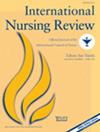Discrimination and Quality of Life During the COVID-19 Pandemic: Experiences of Racial/Ethnic Minority Nursing Staff in the United States
Abstract
Aim
This study aimed to investigate U.S. minority nursing staff's discrimination experiences and the association of such experiences and other critical factors with their quality of life (QoL) during the COVID-19 pandemic.
Background
Racial/ethnic minority nursing staff are at a higher risk of developing unfavorable health outcomes associated with race-based and related discrimination.
Methods
Minority nursing staff were recruited through a professional network. An online survey, consisting of validated measures, was used to assess perceived discrimination, fear of COVID-19, perceived risk of contracting COVID-19, resilience, social support, and QoL. We used the chi-square test, ANOVA, and path analysis to compare racial/ethnic group differences and variables associated with QoL among minority nursing staff.
Results
Our sample consisted of 514 minority nursing staff (31.4% Black, 25.5% Hispanic/Latinx, 17.0% Asian, 13.5% American Indian/Alaska Native, and 12.7% Native Hawaiian/Pacific Islander). The sample reported a high prevalence of discrimination experiences (60% witnessed, 28.3% experienced). Greater exposure to witnessed discrimination, higher levels of perceived risk of contracting COVID-19, and fear of COVID-19 were associated with worse QoL, whereas higher levels of resilience and social support were associated with better QoL. Multiple group analysis revealed no significant differences in these outcomes across the racial/ethnic groups.
Conclusion
Our findings revealed that while discrimination, fear, and perceived risk were negatively related to minority nursing staff's QoL, resilience and social support were crucial in promoting their QoL, with no significant differences observed across racial/ethnic groups.
Implications for nursing and health policy
The findings highlight the importance of individual-, organizational-, and policy-level awareness of vulnerability related to racial/ethnic discrimination and areas that should be addressed to promote minority nursing staff's QoL.


 求助内容:
求助内容: 应助结果提醒方式:
应助结果提醒方式:


